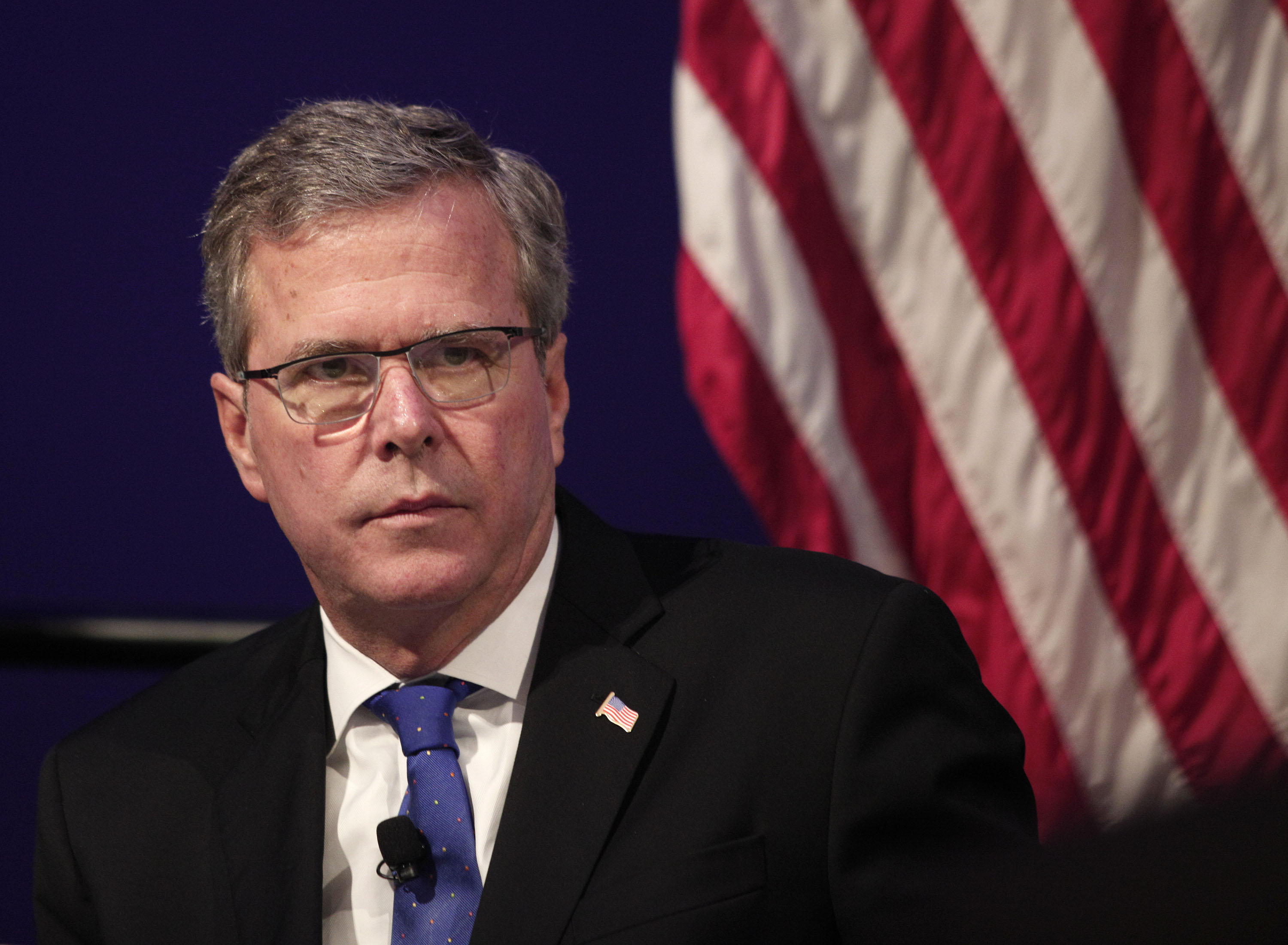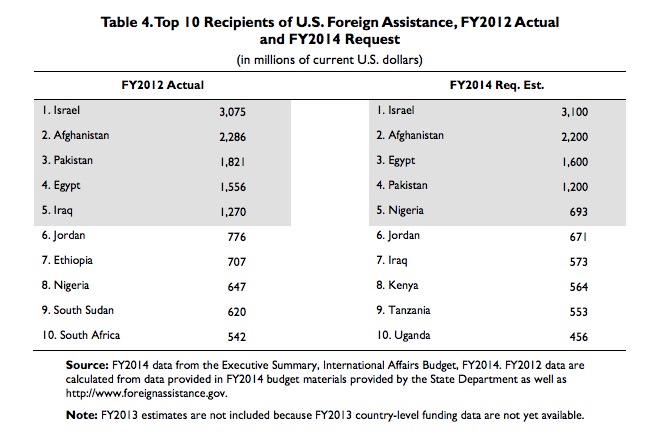This is Jeb Bush's most nonsensical anti-Obama talking point yet
America no longer inspires fear in its enemies? Tell that to bin Laden.


A free daily email with the biggest news stories of the day – and the best features from TheWeek.com
You are now subscribed
Your newsletter sign-up was successful
Jeb Bush was trying to do two things in his big foreign policy address on Wednesday: Show that he is his "own man," not a policy clone of his brother George, the former president; and offer a robust criticism of President Obama's foreign policy.
On the first part, the jury is still out. "For all his bluster about being different from his brother and father, Bush didn't really espouse a particularly unique worldview," say Tim Mak and Jackie Kucinich at The Daily Beast, adding that the "nervous, uncertain speech" was "full of errors and confusion," delivered by a former governor who "did not sound well-versed in foreign policy."
(The Washington Examiner's Paul Bedard, after reading excerpts beforehand, gave a more favorable preview: "A call for U.S. strength that would make Ronald Reagan take note.")
The Week
Escape your echo chamber. Get the facts behind the news, plus analysis from multiple perspectives.

Sign up for The Week's Free Newsletters
From our morning news briefing to a weekly Good News Newsletter, get the best of The Week delivered directly to your inbox.
From our morning news briefing to a weekly Good News Newsletter, get the best of The Week delivered directly to your inbox.
Here, we'll focus on one bit from Bush's slap at Obama: "Under this administration, we are inconsistent and indecisive. We have lost the trust and confidence of our friends. We definitely no longer inspire fear in our enemies." You can watch Bush deliver the line with a little knowing smile, starting at about the 55-second mark:
You may be nodding along, like you've heard this before. You probably have.
Other Republicans have made strikingly similar remarks, but somehow we expect more from Jeb Bush than, say, Sen. Ted Cruz (R-Texas) and Rep. Adam Kinzinger (R-Ill.). Talk to Jeb partisans — he's the "smart Bush" who was supposed to run instead of his brother George. His list of foreign policy advisers is a who's who of Bush (and Reagan) administrations past, the crème de la crème of the GOP foreign policy hawks, plus James Baker.
But "definitely no longer inspire fear in our enemies"? What can that possibly mean? Of course America's "enemies" fear it. The U.S. has, by far, the best, most expensive military in the world, plus enough nuclear missiles to destroy humanity many times over. Thanks to former NSA contractor Edward Snowden and others, friends, enemies, and frenemies alike know that the U.S. is watching, listening, and sometimes destroying Iranian nuclear reactors.
A free daily email with the biggest news stories of the day – and the best features from TheWeek.com
Lots of people in Yemen and the Afghanistan-Pakistan border area — enemies and not — existentially fear the missile-firing U.S. drones that roam the sky. Islamic State may want to fight the U.S. for recruitment reasons, but U.S. airstrikes and financial strangulation haven't been kind to their caliphate. Russia's Vladimir Putin is obviously intimidated by NATO — dominated by the U.S. — encroaching into the former Eastern Bloc.
And the world doesn't just fear America's military. The U.S. is the largest donor of foreign aid, and the top recipients aren't all unambiguously the nation's best friends, as this chart from the Congressional Research Office shows:

You can bet that Pakistan and Egypt fear losing well over $1 billion in annual military and other aid. They'll feign respect if they have to.
Let's give the Republicans using this formulation — America's friends don't respect it, its enemies don't fear it — the benefit of the doubt and assume they mean America's friends respect the U.S. less and its enemies fear it less than when Obama took office. Even then, what's their evidence?
In Jeb Bush's speech, he doesn't get into specifics. Obama and his team "draw red lines... then erase them" — a clear reference to Syria, a nation Obama had every intention to bomb, if Congress had backed him — and "with grandiosity, they announce reset and disengage," a puzzling reference to Russia. "Hashtag campaigns replace actual diplomacy and engagement," which makes sense only under the rubric #Soundbites. "Personal diplomacy and maturity is replaced by leaks and personal disparagement." Is that a slap at John Kerry's level of sophistication?
Fear and respect have similarities, but they're different in crucial ways. And Bush has it backwards in regards to America's friends and allies. Nations may respect and trust "leadership projected consistently and grounded in principles," as Bush proposes to offer, but they don't fear it. You fear what can hurt you, what you don't understand or can't anticipate. On the flipside, foreign leaders may not have confidence in Obama's purported "inconsistent and indecisive" behavior, but it almost certainly gives them fits of trepidation.
Did Libya's Moammar Gadhafi really think Obama would launch airstrikes that helped topple his government and led to his death? Maybe not, but the next leader staring down the U.S. will certainly take that possibility into consideration.
When you look at what Cruz meant in his speech to the Heritage Foundation last December — "Today, the consequences of the Obama/Clinton foreign policy is that our friends no longer trust us, and our enemies no longer fear us" — he seems to be mostly referring to Israel (friend) and Iran (enemy). Cruz also seemed to believe that hitting ISIS with more than 2,000 airstrikes is a form of "empathy."
In his House floor speech a year ago, Kinzinger made some fine points about Syria and the pullout of troops from Iraq, but didn't really address his contention that "our enemies no longer fear us, our allies no longer trust us." In his formulation, U.S. leadership means putting troops in other parts of the world, and Obama isn't doing enough of that. Not that it's all Obama's fault — Kinzinger says we wouldn't be in this situation if Bill Clinton had killed bin Laden in the 1990s (instead of, you know, Obama killing bin Laden in 2011).
What makes your enemy lose their fear is when you try and fail, when it appears you are wearing the emperor's new clothes. The single biggest thing that has weakened America in the past 30 years, among both allies and enemies, was the invasion of Iraq. Most Americans understand that. GOP politicians might want to internalize that, too — none more than Jeb Bush.
On Wednesday, Bush conceded that "mistakes were made" in Iraq, but he also made an astute observation about U.S. presidents: "Each president learns from those who came before — their principles... their adjustments," he said, according to his prepared remarks. "One thing we know is this: Every president inherits a changing world... and changing circumstances."
Obama's foreign policy — and in fact, most likely his presidency — is the result of George W. Bush's actions in office.
But if the world changes, sometimes the talking points remain the same. Under this administration, "we have seen a steady erosion of American power and an unsteady exercise of American influence," Bush said — but it wasn't Jeb, it was George W. talking about Clinton when he was accepting the GOP presidential nomination in 2000.
Obama's foreign policy is far from perfect. But unless these Republicans can explain which enemy no longer fears us and why, thanks to Obama, this talking point should be regarded as the intelligence-insulting rhetorical nonsense it is.
Peter has worked as a news and culture writer and editor at The Week since the site's launch in 2008. He covers politics, world affairs, religion and cultural currents. His journalism career began as a copy editor at a financial newswire and has included editorial positions at The New York Times Magazine, Facts on File, and Oregon State University.
